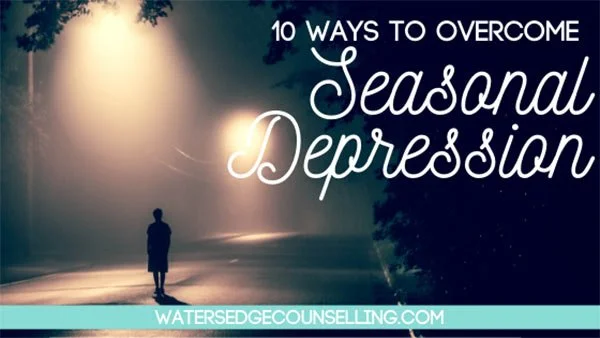Do you have the ‘winter blues’? It’s around this time every year that a lot of people start feeling lethargic, isolated and depressed. We tend to blame ourselves for feeling off; assuming that we must be lazy and that it’s our fault we don’t feel better during these months. But the truth is a lot different—you’re not lazy. You may just have Seasonal Affective Disorder (SADs), a type of Depression that many people experience during particular seasons every year.
SAD in the winter months begins in autumn, and its symptoms include tiredness, putting on weight and feelings of hopelessness. Less often, but still just as valid, summer SAD begins in the spring, and is characterised by insomnia, anxiety and weight loss.
If you find yourself feeling emotionally unwell during the change of seasons, then you may have SAD. But there are some ways you can manage this seasonal depression, and by catching it early, you can have a healthier and happier year.
Here are 10 ways to beat the winter (or summer) blues.
Maintain a regular sleep routine
One of the reasons SAD affects people’s energy levels so much is due to its impact on the body clock. As the seasons change, so does the setting sun, and we find our bodies struggle to get the recommended 8 hours of sleep, or that we sleep too much and try to compensate for the transition. Try to go to bed and wake up at the same time everyday. Eventually your body clock will adjust and so will your mood.
Get some sunlight
The sun is our primary means of raising our serotonin levels by stimulating the chemical and causing it to release in our brain. When the sky is overcast, we miss our natural dose of serotonin, which causes us to feel more depressed. Try to go outside and get some sun everyday. Even if the sun is just peaking through the clouds, you will feel more energised and clear headed.
Explore natural remedies
You don’t have to swear by vitamin supplements or essential oils to benefit from them. If you are struggling with your sleeping routine, talk to your doctor about taking melatonin. If you have insomnia, look into lavender oil. And if anxiety is heightened during these months, consider drinking some jasmine tea.
Exercise
There’s nothing worse than struggling to find the motivation to work out when you feel depressed. However, you can adjust your exercise routine to fit your needs during the tough months. If you can’t get outside to exercise like you would in summer, try working out indoors or join a gym. If intensive cardio is more difficult to do when you feel unwell, choose a lower impact exercise like pilates or yoga. And if all else fails, go for a simple walk with your pet and walk around the mall with some friends. Any movement is good movement.
Drink water
Staying hydrated will optimise your health and wellbeing. It staves off illness, keeps your skin clear, and stimulates your mind. If you’re losing weight or find that it creeps on during these months, use water as your primary drink to keep you energised and to avoid artificial chemicals and sugars.
Catch up with friends regularly
SADs can be incredibly isolating, and it can become more difficult to stay connected with friends and family. Try to have a meaningful catch up with someone you trust once a week. This may look a little different due to social distancing, so if you can’t sit down for a coffee, go for a walk together. Or catch up over Zoom or Facetime. Staying connected will help you feel ‘normal’ and understood when the SADs says otherwise.
Eat well
People put all sorts of pressure on themselves to develop a ‘summer body’ in the cooler months, but it’s not always easy to achieve when you experience SADs. If you are a motivated, goal-driven person, then having a health goal over the tough months can be beneficial. But if this stress causes you more angst and guilt then anything else, simply focus on eating well. Maintain three meals a day, and if you snack, do so in moderation.
Be kind to yourself
Perhaps you feel like you ‘should’ be over this seasonal depression, that you must have done something wrong, or are doing something wrong to have caused it. That’s not true. Whatever the cause and symptoms of your SADs, it is not your fault. Have grace on yourself during the seasons SADs is prevalent. Just do your best, rest when you need to, and remember it will pass.
Write three affirmations everyday
Before you crawl out of bed in the morning, write down three affirmations for yourself. They don’t have to be complicated, just three truths that will motivate you through the day. For example, you might choose, “I am enough,” “I have a whole mind, body and spirit,” or “I am loved and known.” You don’t have to believe them when you say them, but the idea is that by repeating them to yourself, you eventually know them to be true. This will help you combat the feelings of helplessness.
Ask for help
It doesn’t matter if your feelings of depression last for 2 weeks, a month or 6 months, if you don’t feel well, reach out and ask for help. Let a friend know things are harder at the moment, see your GP, and consider talking to a counsellor. When we try to fight the loneliness and exhaustion by ourselves we spiral, and the depression can significantly impact our work, personal life, and our will to live. If you sense yourself spiralling or just need someone to understand, reach out and ask for help. There’s no shame in struggling during the winter or summer months, and you can feel happy and well again.
